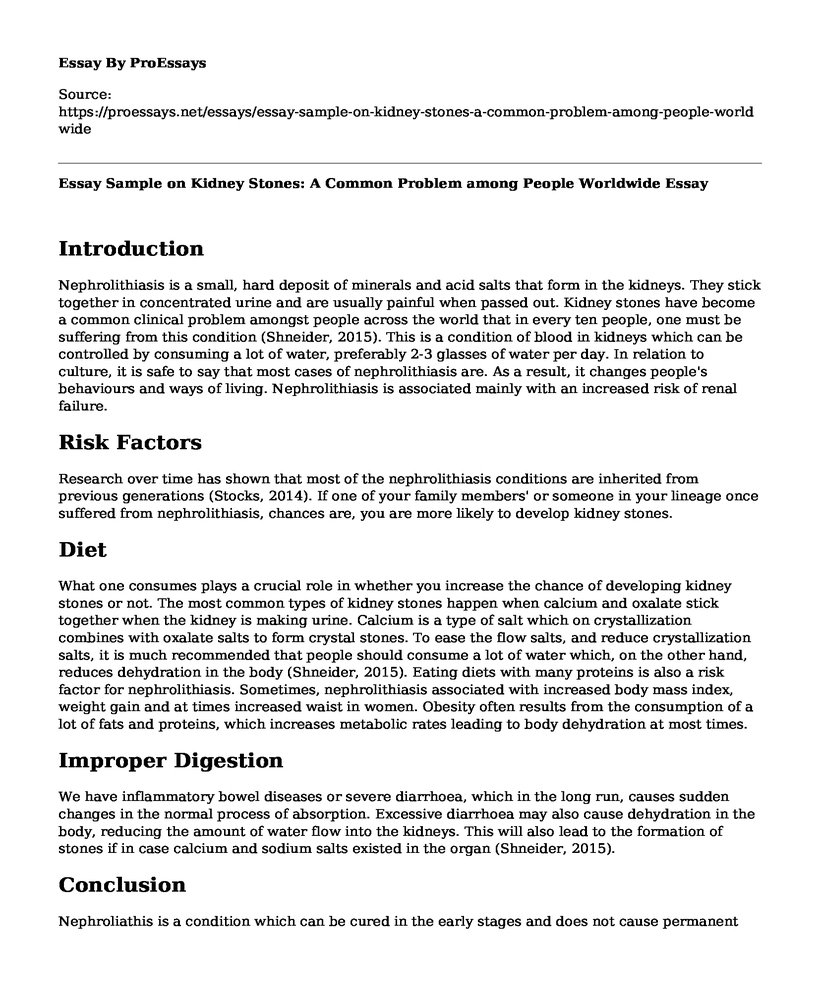Introduction
Nephrolithiasis is a small, hard deposit of minerals and acid salts that form in the kidneys. They stick together in concentrated urine and are usually painful when passed out. Kidney stones have become a common clinical problem amongst people across the world that in every ten people, one must be suffering from this condition (Shneider, 2015). This is a condition of blood in kidneys which can be controlled by consuming a lot of water, preferably 2-3 glasses of water per day. In relation to culture, it is safe to say that most cases of nephrolithiasis are. As a result, it changes people's behaviours and ways of living. Nephrolithiasis is associated mainly with an increased risk of renal failure.
Risk Factors
Research over time has shown that most of the nephrolithiasis conditions are inherited from previous generations (Stocks, 2014). If one of your family members' or someone in your lineage once suffered from nephrolithiasis, chances are, you are more likely to develop kidney stones.
Diet
What one consumes plays a crucial role in whether you increase the chance of developing kidney stones or not. The most common types of kidney stones happen when calcium and oxalate stick together when the kidney is making urine. Calcium is a type of salt which on crystallization combines with oxalate salts to form crystal stones. To ease the flow salts, and reduce crystallization salts, it is much recommended that people should consume a lot of water which, on the other hand, reduces dehydration in the body (Shneider, 2015). Eating diets with many proteins is also a risk factor for nephrolithiasis. Sometimes, nephrolithiasis associated with increased body mass index, weight gain and at times increased waist in women. Obesity often results from the consumption of a lot of fats and proteins, which increases metabolic rates leading to body dehydration at most times.
Improper Digestion
We have inflammatory bowel diseases or severe diarrhoea, which in the long run, causes sudden changes in the normal process of absorption. Excessive diarrhoea may also cause dehydration in the body, reducing the amount of water flow into the kidneys. This will also lead to the formation of stones if in case calcium and sodium salts existed in the organ (Shneider, 2015).
Conclusion
Nephroliathis is a condition which can be cured in the early stages and does not cause permanent inflammation. But with increased cases of nephrolithiasis across the world, this condition should be controlled from the diets to avoid tough renal situations. It is a desire that in future with the increased understanding of parthenogenesis and genetic aspects of kidney stones will lead to the discovery of drugs or a proper way of managing nephrolithiasis.
References
Shneider, M. (2015). Nephrolithiasis: risk factors, treatment and prevention (3rd ed., Vol. 2). New York: Nova Biomedical.
Stocks, P. (2014). Inherited nephrolithiasis Conditions kidney stones. Encyclopedia of Neuroscience, 2(2), 970-1070. doi: 10.1007/978-3-540-29678-2_2445
Cite this page
Essay Sample on Kidney Stones: A Common Problem among People Worldwide. (2023, Feb 27). Retrieved from https://proessays.net/essays/essay-sample-on-kidney-stones-a-common-problem-among-people-worldwide
If you are the original author of this essay and no longer wish to have it published on the ProEssays website, please click below to request its removal:
- Paper Example on Education and Support from the ACS
- Singapore Airlines Case Study Paper Example
- EHRs: Revolutionizing the Medical Industry's Patient Care - Essay Sample
- Essay Example on Climate Change Impact on Humans' Short and Long Term Health
- Nurse-Sensitive Indicators: Assessing Quality of Care - Essay Sample
- Genes, Sperm, Egg: The Inheritance of GENETIC Diseases - Essay Sample
- Protect Yourself and Loved Ones with Influenza Vaccination - Essay Sample







